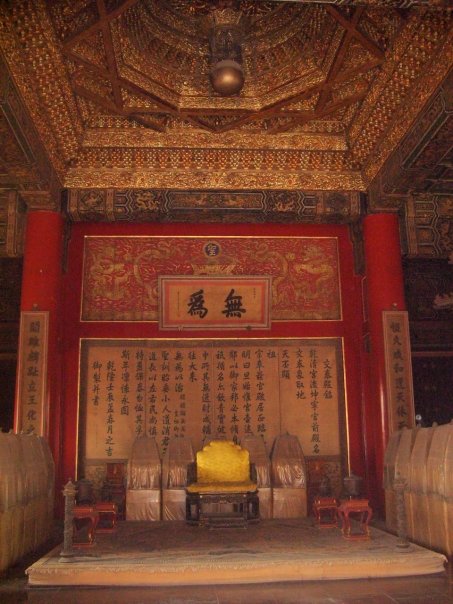切一片西瓜四五两
qiē yí piànr xīgua sì-wǔ liǎng |
Slice me a piece of watermelon, about four or five liangi |
真正的薄皮脆沙瓤儿
zhēnzhèng de bó pí cuì shārángr |
Only the truly thin-skin watermelon comes with this crisp and grainy texture |
当四合院儿的茶房飘着茉莉花儿香
dāng sìhéyuànr de cháfáng piāozhe mòlìhuār xiāng |
When the scent of jasmine wafts in the tea room of the siheyuanii |
夏天的炎热全部被遗忘掉
xiàtiān de yánrè quánbù bèi yíwàng diào |
One forgets all the heat of the summer |
酌一杯佳酿漂远方
zhuó yì bēi jiāniàng piāo yuǎnfāng |
Pour a glass of fine wine as your thoughts wander afar |
胡同儿里酒香醉人肠
hútòngr lǐ jǐuxiāng zuì rén cháng |
The senses are drunk with the fragrance of the wine steeped within the hutong alleys |
当老城角儿的夕阳回荡拨浪鼓儿响
dāng lǎo chéngjiǎor de xīyáng huídàng bōlànggǔr xiǎng |
As the sun sets at the corner of the old city wall that echoes with the beat of the toy rattle-drum |
北京的土著有一点点感伤
Běijīng de tǔzhù yǒu yìdiǎndiǎn gǎn-shāng |
This native Beijinger feels a little sad |
我一个人儿蹲在墙根儿没人der
wǒ yí gè rénr dūn zài qiánggēnr méi rén der |
Squatting alone at the corner of the wall, receiving not even a passing glance |
眼睛愣着神儿心中纳着闷儿
yǎnjīng lèngzhe shénr xīnzhōng nàzhe menr |
With eyes unseeing and confusion in my heart |
怎么今天的我这么没有精气神儿哟
zěnme jīntiān de wǒ zhème méiyǒu jīngqì shénr you |
Why do I feel so weary today? |
好像写歌词儿写丢了魂儿哟
hǎoxiàng xiě gēcír xiědiūle húnr you |
Feels like I lost my soul while writing my lyrics |
大清早路边儿的馄饨摊儿
dàqīngzǎo lùbiānr de húndùntānr |
A wonton stall by the roadside in the early morning |
一个板儿农骑着板儿车拉着板儿砖上班儿
yí ge bǎnrnong qízhe bǎnrchē lāzhe bǎnrzhuān shàngbānr |
A farmer rides a three-wheeled handcart as he pulls his load of bricks to work |
豆腐脑儿一块钱一碗儿
dòufùnǎor yí kuài qián yì wǎnr |
A bowl of jellied beancurd costs a dollar |
风声中飘着京韵大鼓的小段儿
fēngshēng zhōng piāozhe Jīngyùn dàgǔ de xiǎoduànr |
The music of a Pekingese big drum storyteller rings in the air |
喝一碗豆汁儿就一个焦圈儿
hē yì wǎn dòuzhīr jiù yí gè jiāoquānr |
Drink a bowl of sour soy juice with a fried ring of doughiii |
青花儿瓷罐儿滚着麦芽儿香的油渣儿
qīnghuār cíguànr gǔnzhe màiyárxiāng de yóuzhār |
Dregs of oil scented with malt heave in porcelain jars with floral design |
胡同口儿的小贩儿串着冰糖葫芦串儿.
hútòngkǒur de xiǎofànr chuānzhe bīngtáng húlùchùanr |
A hawker at the entrance of a hutong alley is stringing candied haws, |
旁边儿的茶馆儿摆着一张马三立的相片儿
pángbiānr de cháguǎnr bǎizhe yì zhāng Mǎ Sānlì de xiàngpiānr |
There's a photo of Ma Sanliiv displayed at the teahouse nearby |
缸比盆儿深盆儿比碗儿深碗儿比碟子深
gāng bǐ pénr shēn, pénr bǐ wǎnr shēn, wǎnr bǐ diézi shēn |
The vats are deeper than the basins, the basins are deeper than the bowls, the bowls are deeper than the plates |
| Waiting for your consideration |
Waiting for your consideration |
一放好多年它还是这么哏那
yí fàng hǎoduō nián tā háishì zhème gén na |
After being left there for so many years, they're still so funny… |
北京的土著 pay attention……
Běijīng de tǔzhù |
Native Beijingers, pay attention |
站累了蹲着蹲累了坐着
zhànlèile dūnzhe, dūnlèile zuòzhe |
Squat when you're tired of standing, sit when you're tired from squatting |
坐累了躺着躺累了趴着
zuòlèile tǎngzhe, tǎnglèile pāzhe |
Lie down when you're tired of sitting, lie prone when you're tired from lying down |
趴累了睡着睡不着眯着
pālèile shùizhe, shùibùzháo mīzhe |
Sleep when you're tired of lying prone, nap when you're unable to sleep |
养一只八哥儿是倍儿有面子
yǎng yì zhī bāgēr shì bèir yǒu miànzi |
Keeping a myna brings special prestige |
做人要厚道要知道礼貌
zuòrén yào hòudào yào zhīdào lǐmào |
Be kind and generous and courteous too |
见人要问好,千万不要迟到
jiàn rén yào wènhǎo, qiānwàn bú yào chídào |
Greet others kindly and never, ever be late |
斤斤计较只会自寻烦恼
jīnjīn jìjiào zhǐ huì zìxún fánnǎo |
Keeping score only means making trouble for yourself |
不如微笑世界无限美好
bùrú wēixiào shìjiè wúxiàn měihǎo |
Better to smile and the world turns, infinitely beautiful |
公园里老头儿牵着他的老伴儿
gōngyuán lǐ lǎotóur qiānzhe tā de lǎobànr |
There's an old man in the park, hand in hand with his old wife |
七八十岁走起路来还是那么有范儿
qī-bā shí suì zǒuqǐ lù lái háishì nàme yǒu fànr |
About eighty years old and he still looks so suave |
含一根冰棍儿穿一件儿背心儿
hén yì gēn bīnggùnr chuān yì jiànr bèixīnr |
Sucking on a popsicle and wearing a vest |
周口店的血统是非常的纯正
Zhōukǒudiàn de xuětǒng shì fēicháng de chúnzhèng |
Bloodlines run pure at the home of Peking Manv |
就在那右右右右安门的旁边儿
jiù zài nà Yòu-Yòu-Yòu-Yòu’ānmén de pángbiānr |
At the side of the Right-Right-Right-Right Gate of Peace |
有一家狗狗狗狗不理的包子儿
yǒu yì jiā Gǒu-Gǒu-Gǒu-Gǒubùlǐ de bāozir |
There's a shop selling Dog-Dog-Dog-Dog Wouldn’t-Noticevi buns |
切切切切糕买了半斤儿
qiē-qiē-qiē-qiēgāo mǎile bàn jīnr |
Buy half a jinvii of sliced-sliced-sliced-sliced glutinous cakeviii |
逛一个天桥好似神仙
guàng yí ge Tiānqiáo hǎosì shénxiān |
Spend a day free from worries at the Heavenly Bridge,ix just like an immortal |
 From yesterday's editorial in the Philadelphia Inquirer about the conviction of a local political boss, Vince Fumo, on 137 corruption-related charges:
From yesterday's editorial in the Philadelphia Inquirer about the conviction of a local political boss, Vince Fumo, on 137 corruption-related charges:

